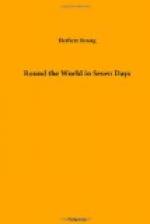Smith was in charge of the aeroplane attached to his ship, the Admiralty having adopted the machine for scouting purposes. It was only recently that he had brought his own aeroplane to its present perfection, after laborious experiments in the workshops he established in the corner of his father’s park, where he toiled incessantly whenever he could obtain leave, and where Rodier was constantly employed. His machine had just completed its trials, and he expected to realize a considerable sum by his improvements. Of this he had agreed to give Rodier one half, and the Frenchman had further stipulated that the improvements should be offered also to the French Government. This being a matter of patriotism, Smith readily consented, remarking with a laugh that he would not be the first to break the entente cordiale.
Just as a voyage round the world was a dream until Drake accomplished it, so a flight round the world was the acme of every airman’s ambition. It was the accident of his father’s plight that crystallized in Smith’s mind the desires held in suspension there. The act was sudden: the idea had been long cherished.
He had decided on his course after a careful examination of the globe borrowed from Mr. Dawkins, the village school-master. The most direct route from London to the Solomon Islands ran across Norway and Sweden, the White Sea, Northern Siberia, Manchuria, Korea and Japan, and thence to New Guinea. But since it traversed some of the most desolate regions of the earth, where the indispensable supplies of petrol and machine oil could not be secured, he had chosen a route through fairly large centres of population, along which at the necessary intervals he could ensure, by aid of the telegraph, that the fuel would be in readiness.
And now he was fairly off. Constantinople was to be the first place of call. He knew the orographical map of Europe as well as he knew his manual of navigation. It was advisable to avoid mountainous country as far as possible, for the necessity of rising to great heights, in order to cross even the lower spurs of the Alps, would involve loss of time, to say nothing of the cold, and the risk of accident in the darkness. Coming to the coast, in the neighbourhood of Dover, about half-an-hour after leaving Epsom, he steered for a point on the opposite shore of the Channel somewhere near the Franco-Belgian frontier. As an experienced airman he had long ceased to find the interest of novelty in the scenes below him. The lights of the Calais boat, and of vessels passing up and down the Channel, were almost unnoticed. On leaving the sea, he flew over a flat country until, on his right, he saw in the moonlight a dark mass which from dead reckoning he thought must be the Ardennes. The broad river he had just crossed, which gleamed like silver in the moonlight, was without doubt the Meuse, and that which he came to in about an hour must be the Moselle. At this point Rodier, who had been dozing, sat up and began to take an interest in things; afterwards he told Smith that they must have passed over the little village in which he was born, and he felt a sentimental regret that the flight was not by day, when he might have seen the red roof beneath which his mother still lived.




